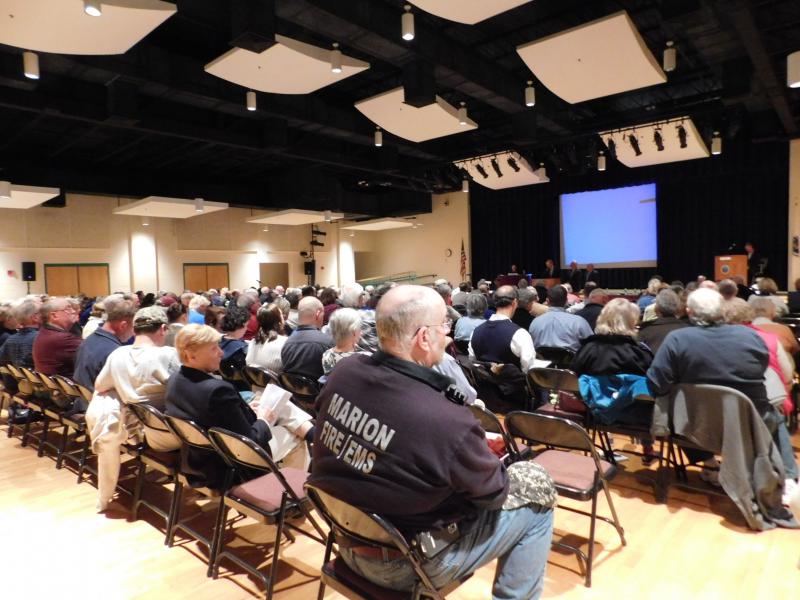Twists, turns and 'flim-flams' at marathon Town Meeting
Marion voters ended their Monday night by approving a $21.95 million budget for the next fiscal year, agreed to a $1.9 million wastewater treatment plant upgrade for maintenance and to meet state standards, OK'd the spending of $33,400 on a study to determine the future of the Town House, and denied a measure that would temporarily shut down permitting of aquaculture sites.
With much on the agenda for voters to discuss, the marathon meeting ended just after midnight early Tuesday morning. For more on the wastewater treatment plant upgrade, see Page 5.
Budget
The $21.5 million increase that was approved included a 131 percent increase in legal payments. When asked if the increased money recommended for legal purposes was due to fighting the state on wastewater treatment plant permit requirements, Town Administrator Paul Dawson said no. He did not explain further.
Voters also questioned a 20 percent increase in Town Facilities costs. Selectman Jody Dickerson explained that the rise in costs was due to the recent acquisition of the Benjamin D. Cushing Community Center, which was gifted to the town by the Marion VFW in December of 2016.
Town House Analysis
Over the past six years, Marion has spent $600,000 to determine whether to renovate the existing Town House, which is currently in a state of disrepair, or whether to move offices to a building (yet to be constructed) on a different site. One recent possibility is ti construct a new building on the grounds of the Benjamin D. Cushing Community Center, formerly the Marion VFW, which has seven acres of open space available.
According to Dawson, studies have determined that a renovation of the existing Town House would cost roughly $7.9 million.
While some residents have argued that the offices should remain in the heart of the village, others lament the time and money spent on studying the issue. Others argue that they should be able to see all the facts (including the cost of building on the VFW property) before making a final decision.
Because the property was only gifted to the town last year, there are no numbers on what that cost would be. "We need to see what both options would cost us," said Marion resident Andrew Daniel. "We need to look at all the options and make the most responsible choice."
Aquaculture Permits
A proposed aquaculture moratorium was placed on the ballot by petitioners, who felt that there was not enough of a development plan in place for Marion Harbor to protect it from ecological harm or improper development in the future.
Marion resident Chris Bryant, an aquaculture farmer, argued vehemently that approval of the moratorium, which would temporarily stop the licensure or expansion of aquaculture farming, would shutter his eight-year-old business. "That's 500,000 oysters that will have to go in the trash. I can't sell them, they aren't big enough. I'd have to trash them."
Many town residents admitted that while they would like to see some sort of development plan in place for Marion's harbor, they were unwilling to stop a current business from practicing. Voters opted to deny the proposal, hoping to bring it back through more effective channels in the future.
ORR Budget Analysis
Town voters also chose to deny a proposal which would have seen Marion pay $5,000 for their share of an analysis of the Old Rochester School Committee's finances.
The proposal was placed on Marion's agenda after the Old Rochester School Committee said there was not enough money in the budget for a full-time art teacher. Tri-town selectmen pointed out that the committee had permitted teacher and administration salary raises of three to four percent, rather than the two percent limit that the selectmen had asked for.
The Mattapoisett Board of Selectmen then suggested bringing in an independent analyst to review the committee's finances.
The proposal had previously been endorsed by Marion's selectmen, as well as Town Administrator Paul Dawson, but voters did not see the measure as necessary.
Condo re-zoning
The re-zoning of several properties on Spring Street into residential lots required a two-thirds majority vote. It was strongly denied.
The lots, located next to the Baldwin Brothers property, were intended to house a 28-unit condominium complex.
Several voters were concerned about placing more strain on Marion's water and sewer systems. Others were not pleased about more apartment housing so near to the Marion Village Estates. "We didn't even have a choice with Marion Village," one voter stated. "We have a choice here, and Marion doesn't need more condos."
Other items on the agenda
A proposed "Marion Water Resource Protection Bylaw" aimed to stop water being withdrawn into any tank vehicle or tank within a vehicle. The proposal, meant to prevent water contamination, was also denied.
An agenda item that asked the town to extend use of Silvershell Beach to residents and their dogs from Sept. 15–June 15 before 8 a.m. and after 6 p.m., was withdrawn on the floor without discussion.
The night wasn't entirely filled with tension though.
Marion resident (and one of the founders of Marion EMS) Dale Jones added a tone of levity at one point, when he amended a proposed $10,000 for EMT equipment down to $3,500, noting that the EMT Association would cover the rest of the bill. “I know that’s change from the way things have been going,” Jones added.
“Quick, he’s giving us money,” joked Town Moderator Jeff Dickerson. “We should hurry up and take it!”















